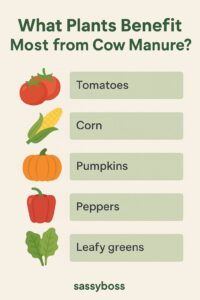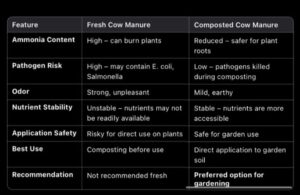Is Cow Manure Good for Gardens? A Complete Guide for Gardeners
You’ve undoubtedly heard of cow dung as a suggested natural soil enricher if you’re a gardener seeking for ideas. However, does cow manure actually work well for gardens? The short answer is that cow manure may be a great organic fertilizer that promotes sustainable gardening methods, increases plant growth, and improves soil health when applied correctly.
This article will discuss the advantages of cow dung, proper usage, and safety measures to consider before incorporating it into your garden.

What Is Cow Manure?
Cow dung is a naturally occurring byproduct of cattle digestion that is rich in nutrients because it is primarily made up of digested grain and grass. Usually, it consists of:
• Nitrogen (N)
• Phosphorus (P)
• Potassium (K)
• Micronutrients like calcium, magnesium, and sulfur
• Organic matter (carbon-based compounds)
These nutrients are essential for plant growth, and the organic content improves soil structure, making cow manure a well-rounded soil amendment.
Benefits of Using Cow Manure in the Garden
1. Nutrient Boost for Plants
The three main plant nutrients—nitrogen, phosphorus, and potassium—are all present in balance in cow manure. These nutrients support:
• Nitrogen: Promotes leafy growth
• Phosphorus: Supports root development and flowering
• Potassium: Enhances overall plant health and disease resistance
While cow manure isn’t the most concentrated source of nutrients compared to synthetic fertilizers, its slow release makes it ideal for long-term soil fertility.
2. Improves Soil Structure
Cow manure’s organic content improves the aeration, water retention, and texture of the soil. Clay-heavy soils become lighter and more friable, whereas sandy soils gain from being able to retain moisture for longer.
3. Stimulates Microbial Activity
Beneficial soil bacteria that break down organic matter, enhance nutrient cycling, and facilitate better plant nutrient absorption are encouraged by cow manure. Plants with healthy microbial activity are healthier.
4. Eco-Friendly and Sustainable
Utilizing cow dung reduces environmental effect and promotes sustainable gardening by recycling waste from animal farms. For organic gardeners in particular, it’s a fantastic substitute for chemical fertilizers.
#Fresh vs. Composted Cow Manure: What’s Better?

Fresh cow manure has a high ammonia content and may carry Salmonella or E. coli, two dangerous infections. Additionally, because of its high nitrogen content, it may “burn” plants if applied directly.
Conversely, composted cow manure has undergone heat processing or aging to eliminate germs and lower ammonia levels. Its nutritional makeup is more stable, it is less odorous, and it is safer.
In short: Always choose composted cow manure for garden use.
#How to Compost Cow Manure
If you have access to raw manure, compost it before use. Here’s how:
1. Mix with carbon-rich materials (like dry leaves, straw, or sawdust) in a 1:1 ratio.
2. Turn the pile regularly to aerate and speed up decomposition.
3. Monitor temperature: A good compost pile heats up (130–160°F), which kills pathogens.
4. Cure for 3–6 months: Let the compost “rest” after the active phase before applying it to your garden.
This process ensures a well-balanced, safe, and odor-free amendment for your soil.
#How to Use Cow Manure in the Garden
1. As a Soil Amendment
Add composted cow manure to your garden soil before to planting. Generally speaking, the soil should be tilled 6–8 inches deep and covered with a 1-2 inch layer.
2. For Vegetable Gardens
Crops like tomatoes, cucumbers, beans, and squash benefit greatly from cow manure. After applying manure to the planting mounds or rows, always give them a good watering.
3. As Mulch or Top Dressing
Composted manure can also be used as mulch in a thin layer around existing plants. Over time, this adds nutrients and aids with moisture retention.
4. In Container Gardening
Mix composted cow dung with topsoil or potting mix for raised beds or potted plants. It improves drainage and increases nutritional content.
#What Plants Benefit Most from Cow Manure?
Cow manure is generally safe for most vegetables, flowers, herbs, and fruit trees. However, heavy feeders like:
• Tomatoes
• Corn
• Pumpkins
• Peppers
• Leafy greens (like spinach and lettuce)
#Precautions When Using Cow Manure
1. Avoid Fresh Manure on Edible Crops
Fresh manure shouldn’t be applied to edible crops around harvest because of the disease risk. For crops that come into contact with the soil, the USDA advises applying raw manure at least 120 days prior to harvest, and for those that don’t, 90 days.
2. Don’t Overdo It
Over-applying manure can lead to nutrient imbalance or runoff, especially with phosphorus. Always follow recommended rates and test your soil if possible.
3. Store Properly
Cow manure should be kept out of the path of water sources and covered to avoid pollution and nutrient leaching.
4. Be Mindful of Weeds
Uncomposed manure may contain weed seeds. Proper composting destroys them.
#Alternatives to Cow Manure
If cow manure isn’t available, here are some alternatives:
• Chicken manure: Higher in nitrogen, but must be composted thoroughly.
• Horse manure: Good for composting, but often contains more weed seeds.
• Worm castings: Rich and gentle for plants.
• Green manure: Cover crops like clover or alfalfa tilled back into soil.
Final Thoughts
When used properly, cow manure is one of nature’s best fertilizers. It is a great option for both home gardens and farms because of its balanced nutrients, organic matter, and soil-enhancing properties. Just keep in mind to apply sparingly, compost first, and avoid going overboard.
You’re not just feeding your plants when you incorporate cow dung into your gardening regimen; you’re also nourishing the soil, promoting biodiversity, and helping to create a more sustainable growing environment.
Therefore, don’t undervalue the potential of a healthy mound of cow manure that has been properly composted the next time you’re searching for a natural way to improve your garden!
